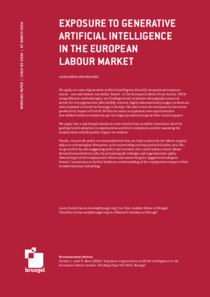Exposure to generative artificial intelligence in the European labour market

Bruegel - Brussels
2024
33 p.
artificial intelligence ; automation ; labour productivity ; employment ; technological change
Working Paper
05/2024
Labour economics
https://www.bruegel.org/sites/default/files/2024-03/WP%2005.pdf
English
Bibliogr.
"We apply two sets of generative artificial intelligence (GenAI) occupational exposure scores – one task-based, one ability-based – to the European Labour Force Survey. While using different methodologies, our findings reveal consistent demographic patterns across the two approaches: jobs held by women, highly educated and younger workers are more exposed to GenAI technology in Europe. We also review the literature on the recent productivity impact of GenAI. Within the same occupations, less-experienced or
less-skilled workers consistently get the largest productivity gains from GenAI support.
We argue that a task-based analysis is more fruitful than an ability-based one, both for guiding GenAI adoption in organisations and their workplaces, and for assessing the employment and job quality impact on workers.
Finally, we provide policy recommendations that can help workers (ie the labour supply) adjust to technological disruption, such as providing training and social safety nets. But we go further by also suggesting policy interventions that could redirect future labour demand towards better jobs, by promoting job redesign and organisational agility. Monitoring GenAI's employment effects and researching the ‘jagged technological frontier' is necessary to further build our understanding of the employment impact of this transformational technology."
Digital
The ETUI is co-funded by the European Union. Views and opinions expressed are however those of the author(s) only and do not necessarily reflect those of the European Union or the ETUI.